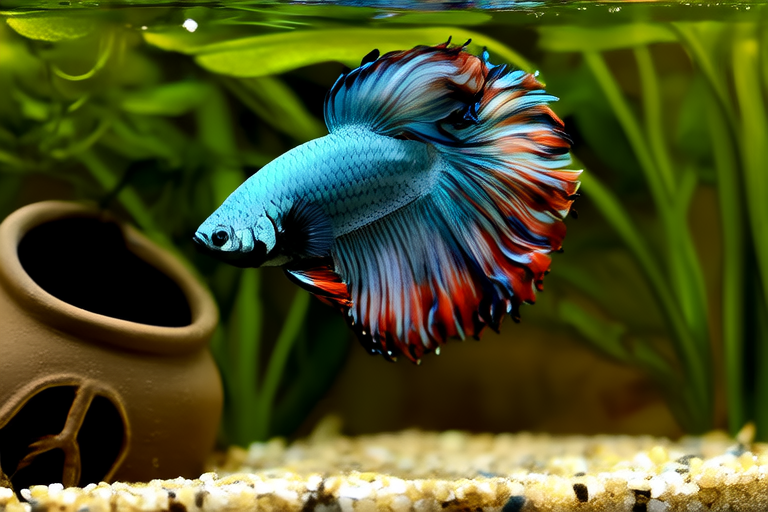Top 5 Secrets to Keeping Your Betta Fish Thriving and Happy
Betta fish, with their vibrant colors and flowing fins, are a favorite among aquarium enthusiasts. However, these beautiful creatures require more than just a bowl of water to thrive. To ensure your betta lives a long, healthy, and happy life, it’s essential to understand their unique needs. In this article, we’ll uncover the top five secrets to keeping your betta fish thriving, covering everything from tank conditions to mental stimulation.
1. Optimal Tank Conditions: Temperature, pH, and Filtration
Betta fish originate from the warm, shallow waters of Southeast Asia, which means they have specific requirements for their aquatic environment. Providing the right tank conditions is crucial for their health and well-being.
Temperature
Bettas are tropical fish that thrive in water temperatures between 76°F and 82°F (24°C to 28°C). Fluctuations outside this range can stress your fish, making them more susceptible to illness. Use a reliable aquarium heater to maintain a consistent temperature, especially if your home experiences significant temperature changes.
pH Levels
The ideal pH level for betta fish is slightly acidic to neutral, ranging from 6.5 to 7.5. Regularly test your tank’s water using a pH testing kit to ensure it stays within this range. If adjustments are needed, use aquarium-safe products to gradually alter the pH rather than making sudden changes, which can shock your fish.
Filtration
A good filtration system is vital for maintaining water quality. Bettas prefer gentle water flow because they are not strong swimmers. Choose a filter designed for small tanks or one with adjustable settings to avoid overwhelming your fish. Additionally, ensure the intake tube has a cover to prevent your betta’s delicate fins from getting caught.
2. Proper Diet and Feeding Habits
Feeding your betta fish a balanced diet is key to their vitality and longevity. Overfeeding or providing poor-quality food can lead to health issues like bloating and fin rot.
Variety in Diet
Bettas are carnivorous and thrive on a protein-rich diet. High-quality betta pellets should form the base of their meals, supplemented with live or frozen foods like brine shrimp, bloodworms, and daphnia. These treats mimic their natural diet and provide essential nutrients.
Feeding Frequency
Feed your betta once or twice a day, offering only what they can consume within two minutes. Overfeeding not only pollutes the water but also leads to obesity, which can shorten your fish’s lifespan. Skip feeding one day a week to allow their digestive system to rest.
Observe Eating Habits
Monitor your betta during feeding times. A healthy betta will eagerly swim to the surface to eat. If they show disinterest or lethargy, it could indicate an underlying health issue or poor water conditions.
3. The Importance of Space and Tank Mates
Contrary to popular belief, betta fish need more space than a tiny bowl. They are territorial and require room to explore and establish their territory.
Tank Size
A minimum tank size of 5 gallons is recommended for a single betta. Larger tanks provide stability in water parameters and reduce stress. Avoid overcrowding, as it can lead to aggression and poor water quality.
Tank Mates
Bettas are known for their aggressive tendencies, particularly toward other male bettas or fish with similar appearances. If you want to add tank mates, choose peaceful, non-aggressive species like neon tetras, corydoras catfish, or snails. Always introduce tank mates gradually and monitor interactions closely.
Solitary Living
If you’re unsure about compatibility, it’s perfectly fine to keep your betta alone. Many bettas thrive in solitary environments where they don’t have to compete for resources or defend their territory.
4. Maintaining Water Quality Through Regular Cleaning
Clean water is the cornerstone of a healthy aquarium. Poor water quality can lead to diseases, stress, and even death in betta fish.
Water Changes
Perform partial water changes (25-30%) weekly to remove toxins and replenish essential minerals. Use a siphon to clean debris from the substrate without disturbing your fish. Avoid changing all the water at once, as this can disrupt beneficial bacteria that help maintain the nitrogen cycle.
Conditioning Tap Water
If you use tap water, treat it with a water conditioner to neutralize harmful chemicals like chlorine and chloramine. Untreated tap water can irritate your betta’s gills and skin.
Monitoring Ammonia and Nitrate Levels
Regularly test your tank’s ammonia, nitrite, and nitrate levels. Ammonia and nitrite should always be at zero, while nitrates should remain below 20 ppm. High nitrate levels can weaken your betta’s immune system, making them more prone to illness.
5. Providing Mental Stimulation with Decorations and Plants
Betta fish are intelligent and curious creatures that benefit from environmental enrichment. A stimulating tank setup can improve their mood and overall health.
Live Plants
Incorporate live plants like java fern, anubias, or amazon sword into your tank. These plants not only enhance aesthetics but also provide hiding spots and improve water quality by absorbing nitrates. Ensure the plants are safe for bettas and do not have sharp edges that could damage their fins.
Decorations
Add decorations such as caves, driftwood, or smooth rocks to create a dynamic environment. Bettas enjoy exploring and resting in secluded areas. Avoid ornaments with sharp edges or tight spaces where their fins could get trapped.
Lighting and Routine
Maintain a consistent day-night cycle by providing 8-10 hours of light followed by darkness. This mimics their natural habitat and helps regulate their biological rhythms. Avoid placing the tank in direct sunlight, as it can cause algae blooms and temperature fluctuations.
Conclusion
Keeping your betta fish thriving and happy requires attention to detail and a commitment to their care. By providing optimal tank conditions, a nutritious diet, adequate space, clean water, and mental stimulation, you can ensure your betta enjoys a fulfilling life. Whether you’re a beginner or an experienced aquarist, these secrets will help you create a harmonious environment where your betta can flourish. Remember, a happy betta is a healthy betta!
